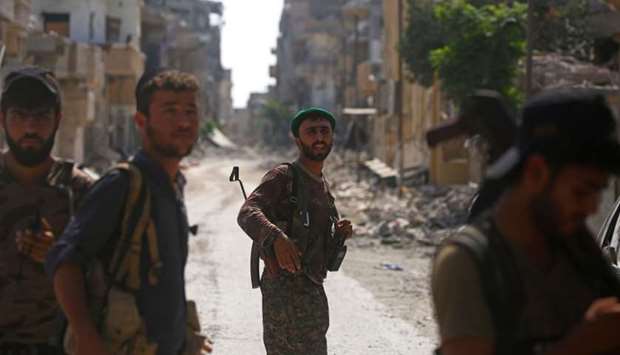The US-backed Syrian Democratic Forces say they are close to defeating the last Islamic State group jihadists holed up in the city, which has been ravaged by US-led coalition air strikes.
The alliance of Kurdish and Arab fighters has captured most of what was once the jihadists' Syrian stronghold, a city that became synonymous with IS's worst atrocities.
But thousands of civilians are feared to remain in Raqqa, some used by IS as human shields according to the SDF.
In the remaining pockets held by the jihadists, the fighters are trying to encourage civilians to flee before they move in.
Near the city's large grain silos, SDF fighters urged civilians who fear IS snipers to emerge from their homes.
Ahmed Abu Al-Sheikh, an SDF fighter with a long beard and a black scarf wrapped around his head, monitored the situation with a radio in his hand.
He heads a special unit responsible for helping evacuate civilians.
"We came here because there are groups of civilians near this point and we got information about their exit," he said.
"There are about 70 metres separating us from the civilians. We're going to get them out of Daesh's hands," he added, using the Arabic acronym for IS.
Last pockets of fighting
Tens of thousands of civilians have fled Raqqa in recent months, some of them escaping as the SDF worked to encircle the city before finally breaking into it in June.
But the UN estimates that up to 15,000 civilians could remain in parts of Raqqa, facing "incredibly difficult conditions", including shortages of food, water and medicine.
Fleeing is a dangerous undertaking, with IS snipers regularly opening fire on escaping civilians and routes out strewn with mines.
Evidence of IS rule remains all around, including a billboard reading "jihad" that sits among the destruction.
Earth berms created by IS in a bid to slow the SDF's advance can be seen on many streets in the city, and on the walls the words "God is greatest" are written in black.
The SDF began its attack on the city in June on two fronts, entering from the east and then the west.
But its advances in the centre of Raqqa now mean its fighters can cross from one side to the other directly.
"We are crossing for the first time from the western front to the eastern front because our forces now hold most of the city," said Jihan Sheikh Ahmed, spokeswoman for the "Wrath of the Euphrates" campaign to capture Raqqa.
"We control 80 percent of Raqqa and the other 20 percent is in the firing line of our forces," she told AFP on Thursday inside the city.
She said IS fighters had holed up inside the Raqqa national hospital, the local sports stadium and several parks nearby.
"There are tunnels that connect several strategic places. We're trying to seize the national hospital but Daesh is holding civilians inside it as human shields and that is slowing our progress."
'Historic moments'
US-led coalition air strikes hit near the silos and stadium on Thursday, sending clouds of grey smoke into the air above.
The sporadic sound of gun and mortar fire could be heard, but among the SDF, spirits were running high.
Some of the fighters around Sheikh Ahmed were singing and even broke into the traditional dabkeh dance to show their confidence that the battle for the city is nearing its end.
"We're in the final stage and will deliver victory to our people in Raqqa within weeks," Sheikh Ahmed said.
"Victory is near."
SDF commander Rojda Felat said the remaining IS fighters in the city "no longer have the ability to launch attacks or dispatch car bombs."
"This is clear from their latest movements. We expect them all to be killed in Raqqa."
The SDF expects to declare victory in the city within "weeks", according to Sheikh Ahmed.
"We promised our friends who were martyred this victory," said Berkhdan, a young fighter wearing a green scarf with a floral pattern wrapped around his head.
"We feel happy because we're witnessing historic moments with the fall of Raqqa and the defeat of Daesh," he added.
"The liberation of Raqqa will enter the history books."

